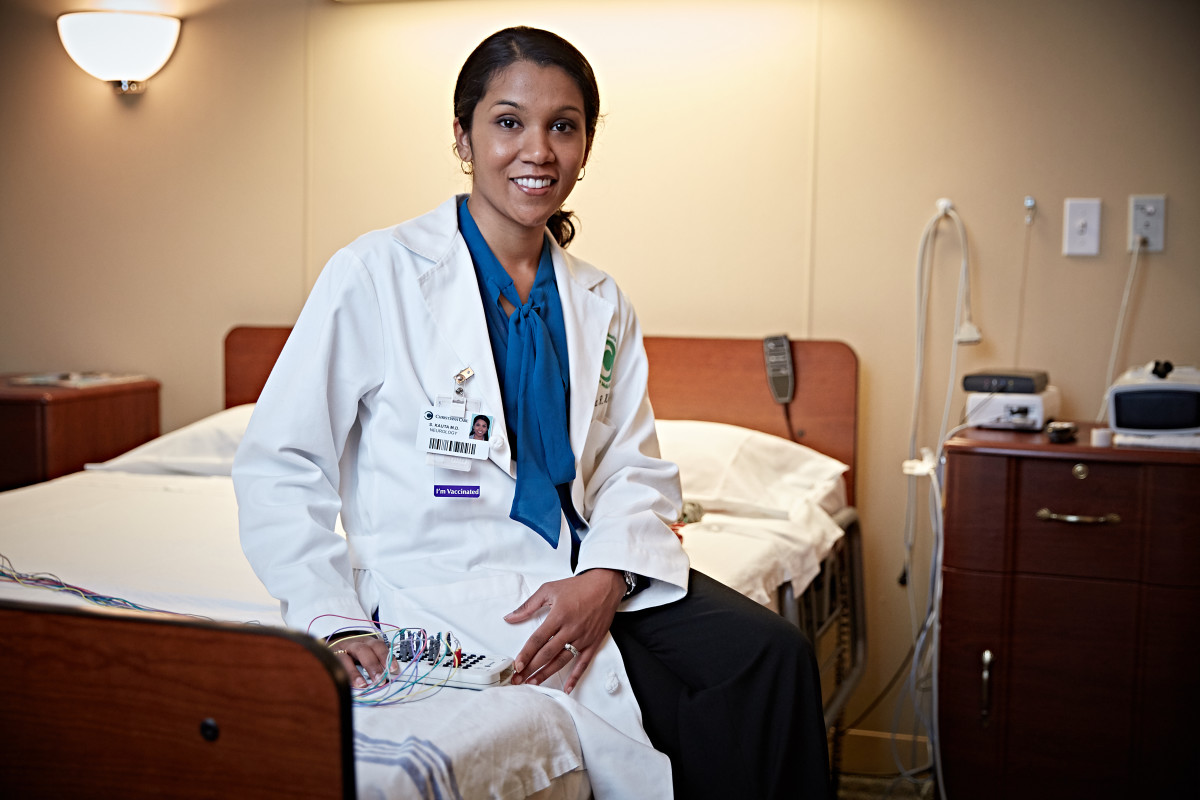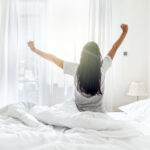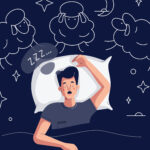When Eric Rendulic consulted with his primary care doctor earlier this year, he mentioned that he snored loudly, woke up two or three times at night and felt drowsy during waking hours.
These are signs of frequent pauses in breathing caused by an obstructed airway, suggesting that Rendulic was struggling with sleep apnea. For a thorough diagnosis, the 32-year-old Middletown man was referred to Christiana Care’s Sleep Disorders Center.
“When people come to the lab, their primary care doctor has recognized something is wrong,” said Mary Rose Hancock, RPSGT, RST, manager of the Sleep Disorders Center. “We have a full range of diagnostic tools for an overnight sleep study to help patients like Eric. Sleep apnea is the number one reason that people come to the lab.”
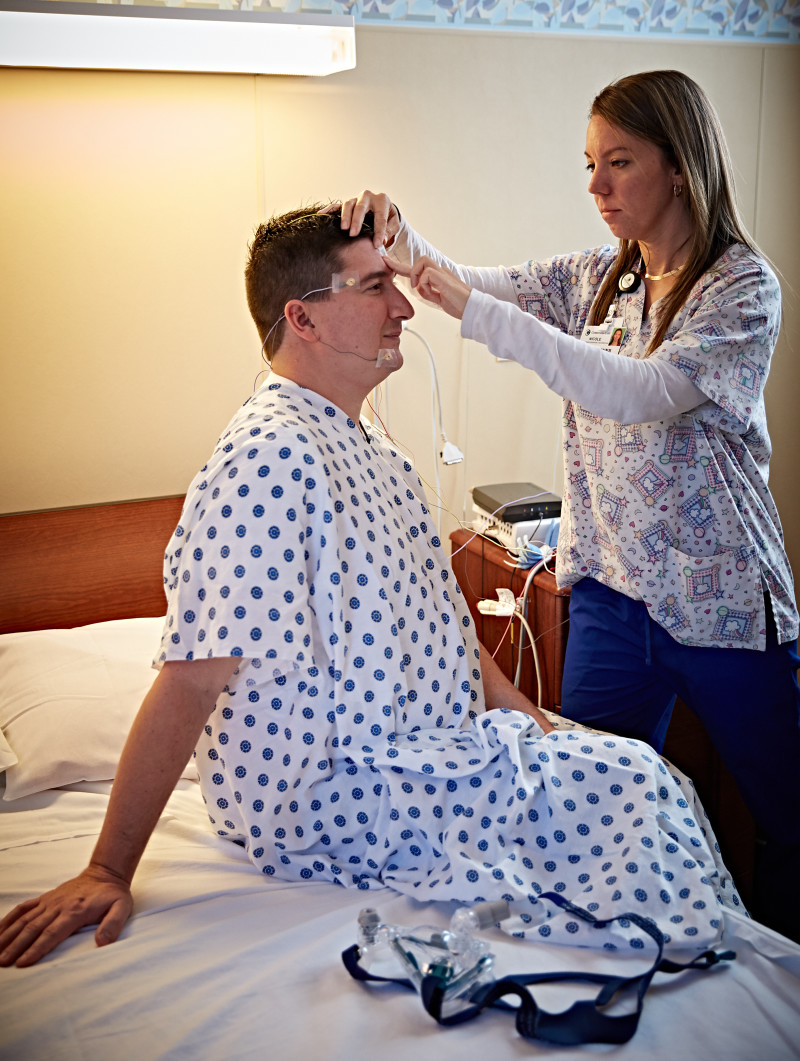
In July 2015, the Sleep Disorders Center was accredited by the American Academy of Sleep Medicine (AASM), the only professional society dedicated exclusively to the medical subspecialty of sleep medicine. The AASM develops clinical guidelines for the sleep field and accredits both sleep disorders centers and home sleep-testing programs. Christiana Care now has accreditations for both. To earn accreditation, a sleep center is evaluated on personnel, training, equipment, data collection, and policies and procedures for a range of disorders.
“The Sleep Disorders Center is an important resource to the local medical community and provides academic and scientific value, in addition to the highest quality care for patients suffering from sleep disorders,” said AASM President Nathaniel Watson, M.D.
Shilpa Kauta, M.D., director of the Sleep Disorders Center, can assist patients with problems such as insomnia, restless leg syndrome, sudden daytime attacks of deep sleep (narcolepsy), sleep walking, night terrors, teeth grinding and sleep apnea.
Americans in general are sleep-deprived, she said. Despite a growing awareness of the importance of a good night’s sleep in maintaining health, too many sleep problems go undertreated. According to the National Institutes of Health, close to 70 million Americans suffer some type of sleep problem, with sleep apnea being a common disorder, one linked to high blood pressure, diabetes and risk factors for stroke and heart failure. Sleep apnea is a disorder in which breathing repeatedly stops and starts during sleep, often waking the person up repeatedly throughout the night.
“We’re fortunate that sleep apnea is treatable,” Dr. Kauta said. “Patients often have success with the use of a CPAP (continuous positive airway pressure) machine at home and get the benefit of an improvement in their sleep quality.” A CPAP machine delivers an adjustable amount of air pressure through a mask that the person wears during sleep, preventing airways from collapsing and enabling steady breathing.
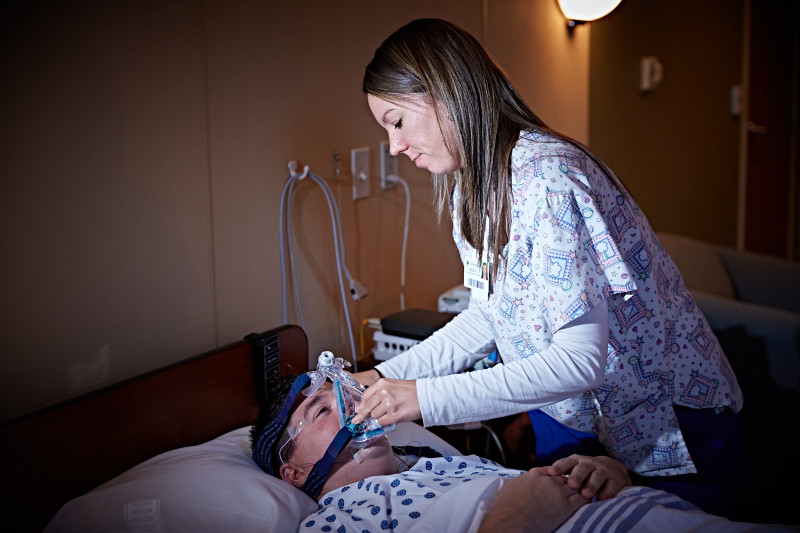
In the Sleep Disorders Center, there are eight rooms for overnight studies and a ninth for daytime sleep testing. The rooms are similar to hotel bedrooms, except that in addition to a TV and a large adjustable bed, there is a camera and microphone for monitoring and recording the sights and sounds of sleep. There is also equipment to monitor brain waves, eye movements, the heart’s electrical activity, leg movements and breathing.
In an adjacent section of the center there is a control room where technicians, licensed by the state of Delaware, monitor computer screens to keep track of data as it’s recorded.
Rendulic, who works for Christiana Care as a CT scan technician, brought a favorite blanket and pillow for the study. He said with all the monitoring of his vital signs he thought he would have trouble sleeping. His worries were unfounded, but when he awoke the next day, he learned that he had a moderate form of sleep apnea and had stopped breathing 60 times during the night.
“This explains why I have sometimes felt like I was in a fog and could feel run down,” he said.
With this diagnosis, Rendulic returned for a second sleep study and to spend a night using a CPAP machine. The stay allowed technicians to adjust the machine’s positive airflow during the night. Afterward, the sleep center referred him to medical supply companies so he could obtain a CPAP machine for home use.
Now, after several months sleeping with a CPAP machine, he says he’s enjoyed improved sleep and relief of his daytime symptoms.
“I have more energy,” he said. “I am also more alert and have more ability to get things done. I am so happy I got this resolved.”
